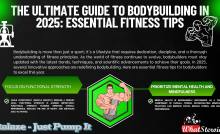The Definitive Guide to the Push-Pull Legs Routine
What In The World Is The Push Pull Legs Routine?
The Push-Pull Legs routine is nothing but an advanced weightlifting program that consists of three types of exercises:
- Push Exercise
- Pull Exercise
- Legs Exercise
1) Push Workouts
The push exercises that are a part of this exercise routine put emphasis on your upper body muscles which means that they develop your shoulder muscles, triceps, and biceps.
Read More: How To Build Massive Thighs
Push exercises generally revolve around dipping, dumbbell bench presses, barbell bench presses, and triceps isolation exercises.
2) Pull Workouts
The pull exercises that are a part of this weightlifting program put emphasis on your biceps and on your back muscles as well. Therefore, we can say that pull workouts are “biceps and back” exercises.
Must Read: Pull-Ups Exercises
These exercises revolve around barbell rowing, dumbbell rowing, chin-ups, pull-ups, and pull-downs. They also revolve around biceps isolation exercises.
3) Leg Workouts
The leg workouts that are a part of the Push-Pull Legs weightlifting plan put emphasis on your glutes, quads, calves, and your hamstrings.
These exercises revolve around exercises such as lunges, squats, calves isolation, glutes isolation, and hamstrings isolation exercises.
Must Read: How to Build Strong Hamstring Muscle?
The Advantages Of Push Pull Legs Routine
There are a couple of reasons why Push Pull Legs weightlifting plan is a favorite plan among professional and non-professional bodybuilders and power-lifters. The first reason why the Push Pull Legs routine is a favorite among power-lifters and bodybuilders is that it heavily consists of compound exercises. Wait, what in the world are compound exercises?
Well, compound exercises are those exercises that target large muscle groups and which develop body strength. But why are compound exercises of such great significance to bodybuilders, power-lifters, and other people alike? The reason why these exercises are important is that they will gain your size and strength better than various isolation exercises.
How To Make The Push Pull Legs Routine Work For You Always
Now that you have learned some amazing things about the Push-Pull Legs weightlifting routine, you are probably ready to hit the gym and do exercises that are a part of the routine.
The first thing that you should do before you commence with the Push-Pull Legs routine is to figure out for how many days per week you will be able to hit the gym. If you really want to feel the benefits of the Push-Pull Legs routine and you have the time to feel them, then we recommend you to train at least five to six days a week.
If you don’t have spare time, you can still see some awesome results with working out two to three times per week. Also, if you can only train one day per week, then you won’t feel the benefits of the Push-Pull Legs routine.
How to Get the Most out of the Push-Pull Legs Routine
There are a few tips on how to get the most out of the Push-Pull Legs routine that we would love to share with you:
- Once You Hit the Maximum of Your Repetitions Range for One Set, You Should Move Up in Weight.
- Each 4 to 6 Repetitions Set You Should Rest For 3 Minutes. Between All Other Sets, You Should Be Resting For 2 Minutes
- Reduce the Intensity of Workouts Every Four to Six Weeks.
Should You Use Supplements?
We saved this for the end because, honestly, it’s far less important than training and eating well. You need to know that taking supplements doesn’t build a great physique. What builds a great physique are a proper nutrition and training.
Must Read: Do Bodybuilding Supplements Really Work?
But still, if you want to take some serious shit. I would recommend buying the Crazy BULK Products, it would explode your routine and give you some serious mass and strength.
Unfortunately, many people fall for taking supplements. Because these products are filled with shenanigans. Such as pseudoscience, misleading endorsements, hilarious hype, ridiculous marketing claims, flashy packaging’s, and under-doses key ingredients. Taking supplements while on Push Pull Legs weightlifting routine will be a complete waste of both your time and money.
Recent Posts
Creatine vs Myostatin: An Expert’s Analysis
Myostatin, a protein encoded by the MSTN gene, acts as a regulator of muscle growth.…
Raloxifene (Evista) 101: A Non-Surgical Solution for Gyno
Raloxifene, a selective estrogen receptor modulator (SERM), is one of the most valuable yet less…
Mastering Bodybuilding in 2025: Top Fitness Tips for Success
Bodybuilding is more than just a sport; it's a lifestyle that requires dedication, discipline, and…
Why Post-Cycle Therapy (PCT) Fails After a Nandrolone Cycle
Nandrolone, or Deca Durabolin, is an injectable anabolic steroid often used by bodybuilders during the…
Counteracting Anabolic Resistance with Adaptogens in Aging Men
As people age, maintaining muscle mass and strength becomes increasingly challenging due to a natural…
Tips on How to Store Peptides and HGH
When peptides are mixed with bacteriostatic water (BAC water), their longevity is highly influenced by…






